With the prevalence of kidney disease in cats being a significant concern for feline health, understanding the fundamentals of this condition is crucial for pet owners. From recognizing the early signs to implementing appropriate management strategies, the complexities of kidney disease in cats require a thoughtful approach.
By delving into the nuances of this ailment, one can equip themselves with the knowledge needed to navigate the challenges it presents and ensure the well-being of their furry companions.
Stay tuned to uncover essential insights into this prevalent condition and how best to address it for optimal feline health.
Key Takeaways
- Kidney disease in cats impacts waste filtration and mineral regulation, with acute and chronic types affecting older cats.
- Symptoms vary; routine testing aids early detection.
- Treatment includes medications for blood pressure and hormone therapy.
- Preventative measures like water intake and weight management support kidney health.
Kidney Disease Types in Cats
In cats, the two main types of kidney disease are acute and chronic, with chronic kidney disease (CKD) being more prevalent in older felines. Acute kidney disease often arises suddenly due to factors like poisoning or infection, leading to a rapid decline in kidney function.
On the other hand, chronic kidney disease develops gradually over time, impacting the kidneys' ability to function properly. CKD is a progressive condition that requires long-term management to support the cat's health and well-being. Understanding the type of kidney disease affecting a cat is crucial in determining the appropriate treatment and care needed to maintain quality of life.
Regular veterinary check-ups play a vital role in monitoring kidney health and managing the disease effectively.
Causes and Risk Factors
Various factors contribute to the development of kidney disease in cats, ranging from exposure to toxic substances to underlying health conditions such as diabetes and infections. Understanding these causes and risk factors is crucial in managing and preventing kidney disease in feline companions.
Here are three key points to consider:
- Toxic Substances: Certain household items like lilies, antifreeze, and certain medications can be toxic to cats and may lead to kidney damage.
- Underlying Health Conditions: Chronic conditions such as diabetes, high blood pressure, and urinary tract infections can strain the kidneys over time, increasing the risk of kidney disease.
- Genetics: Some breeds are genetically predisposed to kidney issues, highlighting the importance of regular check-ups for early detection and intervention.
Symptoms and Detection
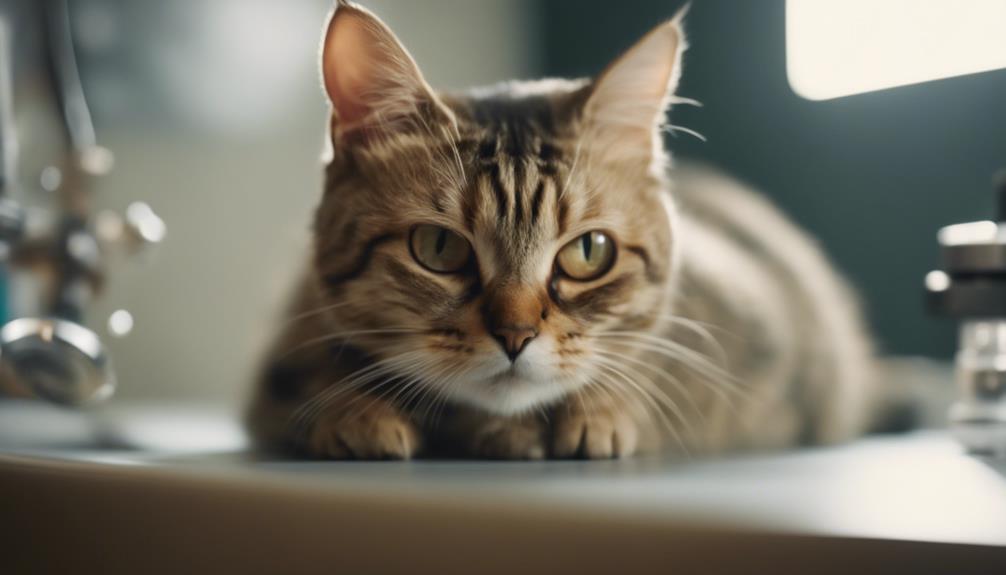
Understanding the manifestations and early identification of kidney disease in cats is imperative in providing timely intervention and care for affected felines. Symptoms of kidney disease in cats can vary depending on whether it is acute or chronic. Acute signs may include poor appetite and lethargy, while chronic signs often manifest as increased thirst and weight loss.
Routine wellness testing, especially in older cats who are more susceptible to chronic kidney disease, plays a crucial role in early detection. Veterinarians utilize a staging system to assess the severity of chronic kidney disease, aiding in determining prognosis and treatment strategies.
Being vigilant for these symptoms and seeking prompt veterinary attention can help improve the quality of life for cats with kidney disease.
Importance of Wellness Testing
Regular wellness testing plays a vital role in the proactive management of kidney disease in cats, allowing for early detection and intervention to maintain their overall health.
Importance of Wellness Testing:
- Early Detection: Wellness tests can identify kidney issues before symptoms manifest, enabling prompt treatment.
- Monitoring Progression: Regular testing helps track the progression of kidney disease, aiding in adjusting treatment plans accordingly.
- Preventive Care: Wellness tests provide insights into overall health, guiding preventive measures to support kidney function and quality of life.
Staging System for CKD
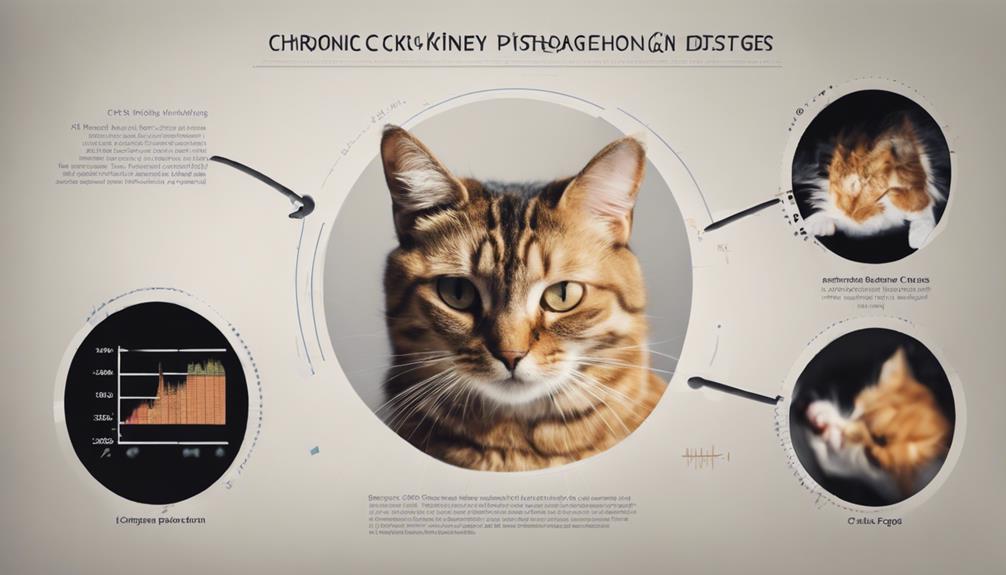
The staging system for Chronic Kidney Disease (CKD) in cats categorizes the severity of the condition based on specific criteria, aiding veterinarians in making informed prognosis and treatment decisions. This system typically ranges from Stage 1 (mild) to Stage 4 (severe), considering factors like blood creatinine levels, blood pressure, protein levels in urine, and the presence of clinical signs.
Staging helps determine the progression of the disease, guiding the treatment approach and allowing for better monitoring of the cat's condition over time. By classifying CKD into different stages, veterinarians can tailor their interventions to meet the individual needs of the feline patient, promoting a more personalized and effective management of the disease.
Medications and Treatments
To effectively manage Chronic Kidney Disease (CKD) in cats, a combination of medications and treatments plays a crucial role in improving the cat's overall well-being and quality of life.
Medications and Treatments for CKD in Cats:
- Blood Pressure Medication: Controlling blood pressure is vital as high blood pressure can worsen kidney damage.
- Hormone Therapy: Helps alleviate anemia symptoms and enhances the cat's overall quality of life.
- Dietary Management: Specialized diets low in protein and phosphorus can ease the workload on the kidneys and support kidney function.
Blood Pressure Management
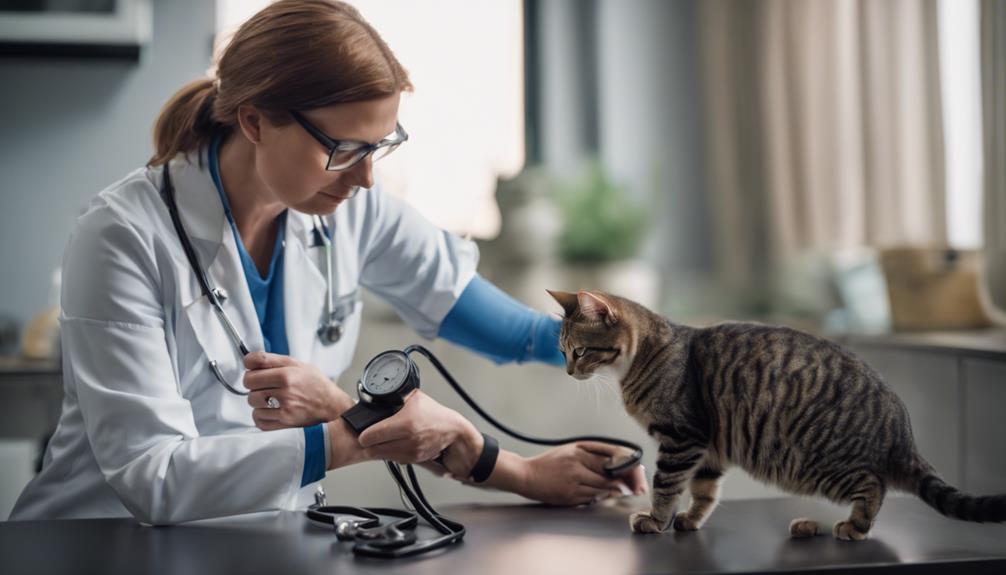
Effective management of blood pressure is crucial in cats with kidney disease to prevent further deterioration of renal function. High blood pressure, commonly seen in cats with kidney disease, can exacerbate kidney damage and compromise overall health. Controlling blood pressure helps maintain proper blood flow to the kidneys, reducing the strain on these vital organs.
Your veterinarian may prescribe specific medication to regulate blood pressure and protect the kidneys from additional harm. Regular monitoring of blood pressure levels is essential to adjust treatment as needed and ensure optimal kidney function.
Hormone Therapy Benefits
Optimizing kidney function in cats with kidney disease can be facilitated through the beneficial application of hormone therapy.
Benefits of Hormone Therapy in Cats with Kidney Disease:
- Improved Anemia Symptoms: Hormone therapy can help address anemia commonly seen in cats with kidney disease, enhancing their overall well-being.
- Enhanced Kidney Function: By supporting kidney function, hormone therapy can aid in maintaining the balance of essential minerals and waste filtration.
- Increased Quality of Life: Cats undergoing hormone therapy for kidney disease often experience improved energy levels and appetite, leading to a better quality of life.
Integrating hormone therapy into the treatment plan for cats with kidney disease can significantly contribute to their health and comfort.
Comfort and Symptom Management
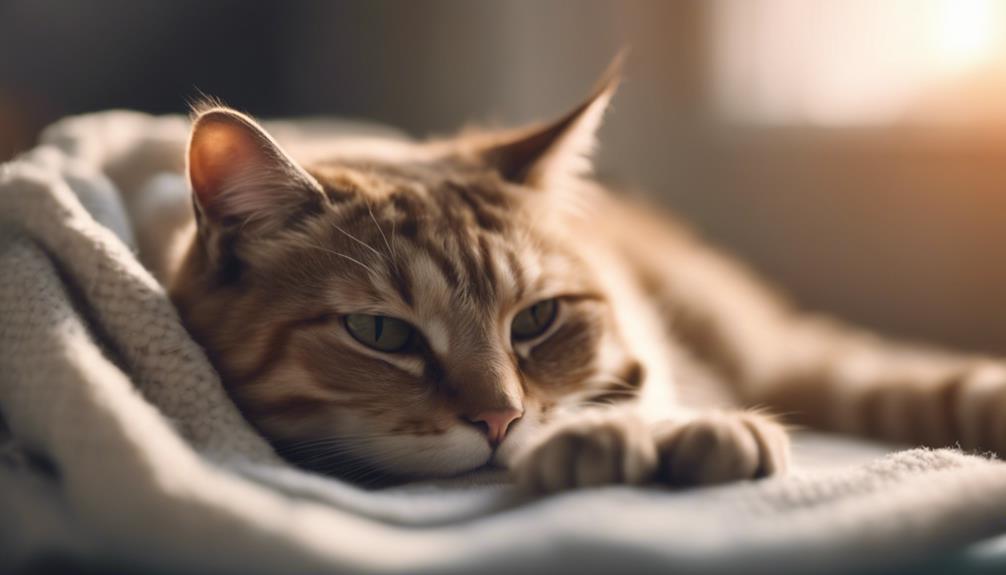
Comfort and symptom management play vital roles in ensuring the well-being of cats with kidney disease, focusing on alleviating discomfort and maintaining quality of life. Cats with kidney disease may exhibit symptoms like increased thirst, weight loss, and lethargy, impacting their day-to-day comfort. While kidney disease itself may not be painful, managing symptoms such as nausea and appetite loss is crucial for their overall well-being.
Providing a comfortable environment, ensuring access to fresh water, and offering a balanced diet tailored to their condition can significantly improve their quality of life. Regular veterinary check-ups are essential to monitor their condition and adjust treatment plans accordingly. By prioritizing comfort and symptom management, cat owners can help their feline companions live more comfortably with kidney disease.
Nausea and Appetite Loss
Nausea and appetite loss are common symptoms observed in cats suffering from kidney disease, impacting their overall well-being and quality of life.
Key Points:
- Nausea Management: Cats with kidney disease may experience nausea, leading to decreased appetite. Addressing nausea can help improve their willingness to eat.
- Appetite Stimulants: In some cases, appetite stimulants prescribed by a veterinarian can encourage cats to eat, ensuring they receive proper nutrition.
- Nutritional Support: Offering highly palatable and easily digestible food tailored to cats with kidney disease can help maintain their nutritional intake despite appetite fluctuations.
Understanding and addressing these issues can play a crucial role in supporting the comfort and well-being of cats battling kidney disease.
Preventative Measures for Kidney Health
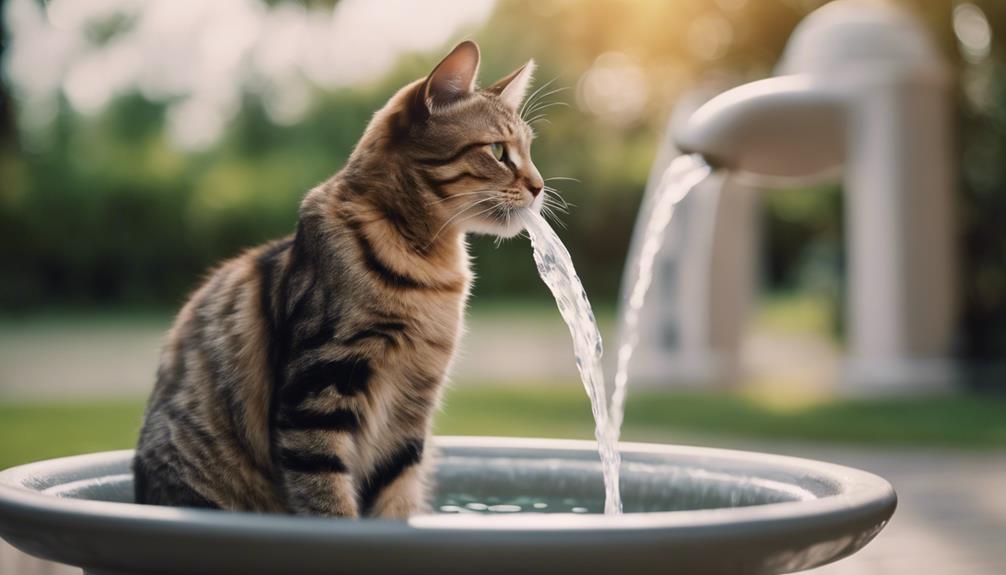
To promote kidney health in cats, implementing preventive measures such as providing access to fresh water and maintaining a healthy weight is crucial. Additionally, feeding a balanced diet low in phosphorus can help support kidney function. Below is a table summarizing key preventative measures for maintaining kidney health in cats:
| Preventive Measures | Description |
|---|---|
| Access to Fresh Water | Ensure clean and easily accessible water sources |
| Balanced Diet | Feed low-phosphorus food to support kidney function |
| Healthy Weight | Prevent obesity and related conditions like diabetes |
| Regular Exercise | Encourage physical activity for overall health |
| Stress Management | Minimize stressors to support kidney well-being |
Annual Vet Check-ups
Regular annual veterinary check-ups are essential for monitoring the overall health and detecting early signs of kidney disease in cats.
Why Annual Vet Check-ups are Crucial:
- Early Detection: Regular vet visits can help catch kidney disease in its early stages, improving prognosis and treatment outcomes.
- Comprehensive Wellness Monitoring: Veterinarians can assess kidney function through blood tests and urinalysis during yearly check-ups.
- Tailored Preventative Care: Individualized care plans, including diet modifications and lifestyle adjustments, can be implemented to support kidney health based on annual vet assessments.
Frequently Asked Questions
Can Kidney Disease in Cats Be Passed on Genetically or Is It Purely Environmental?
Kidney disease in cats is primarily influenced by environmental factors like diet and infections rather than genetics. While genetic predispositions may play a minor role, preventive measures like regular vet check-ups and a healthy lifestyle are crucial in managing kidney health.
Are There Any Alternative or Holistic Treatments That Can Help Manage Kidney Disease in Cats?
Alternative or holistic treatments for managing kidney disease in cats may include acupuncture, dietary supplements, and herbal remedies. While complementary therapies can support conventional treatment, consult with a veterinarian for a comprehensive and tailored approach.
How Does Stress or Anxiety Impact the Progression of Kidney Disease in Cats?
Stress and anxiety can exacerbate kidney disease in cats by triggering physiological responses that affect kidney function. Managing stress through a calm environment, routine, and positive interactions can help mitigate the impact of these factors on disease progression.
Are There Specific Dietary Recommendations That Can Help Support Kidney Health in Cats With Kidney Disease?
Specific dietary recommendations can aid in supporting kidney health in cats with kidney disease. Low-protein diets, phosphorus restriction, and increased water intake are commonly recommended. Consult a veterinarian for tailored nutrition plans to manage feline kidney disease effectively.
Can Kidney Disease in Cats Ever Go Into Remission, or Is It a Lifelong Condition That Requires Management?
Kidney disease in cats is typically a lifelong condition that requires continuous management. While certain treatments can help slow its progression and alleviate symptoms, achieving remission is uncommon. Regular veterinary care is essential for optimal care.
Conclusion
In conclusion, understanding kidney disease in cats is essential for ensuring the well-being of our feline companions. By recognizing the different types, causes, symptoms, and treatment options, cat owners can take proactive steps to manage the condition effectively.
Regular wellness testing and vet check-ups play a crucial role in early detection and intervention. With proper care and attention, we can strive to improve the quality of life for cats affected by kidney disease.




